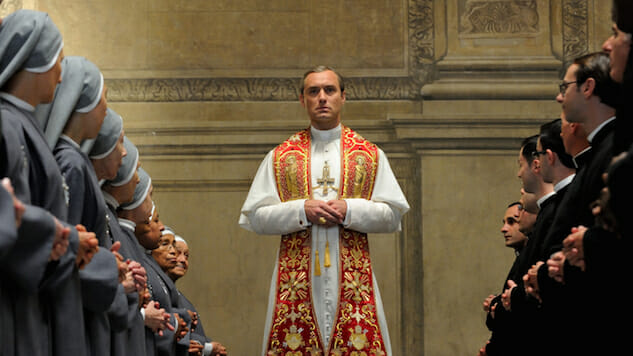The Young Pope Is a Comedy, and Nearly a Great One
HBO
Handsomer than Jesus himself, as crisply dressed in his virgin-white vestments as James Bond stalking Savile Row, Pope Pius XIII, né Lenny Belardo (Jude Law), is also, as it happens, a card. In The Young Pope, from Italian filmmaker Paolo Sorrentino (The Great Beauty, Youth), the first American pontiff’s devilish sense of humor—delivered in biting deadpan, or perhaps with a snort—lands upon his punctilious rival, Cardinal Voiello (Silvio Orlando), the sexual proclivities of priests, even the existence of a higher power: “I’m saying that I don’t believe in God, Tommaso,” he declares in the course of confession, before assuring his horrified interlocutor that his words are jests. If it’s far from clear that Lenny is, in fact, cracking wise, this is only fitting; Sorrentino’s embarrassingly luxe, impossibly smug, sublimely heretical miniseries is an electric nest of crossed wires, constantly confusing the viewer’s sense of where the serious ends and the satirical begins. His sly, often surprising preoccupation is mocking the ostentation of Vatican manners, at which he succeeds, in part, because he appreciates pomp and circumstance, too.
The Young Pope, then, is a comedy, and nearly a great one: As Il Papa proclaims in the series’ third episode, which begins, quite literally, with a wink, “My jokes contain the truth.”
Sorrentino’s most significant advantage, on this front, may be misdirection. Though advertised as a portrait of palace intrigue, The Young Pope is so tonally slippery as to defy categorization; alongside foreboding thunderclaps in St. Peter’s Square, it finds Diane Keaton, as Lenny’s longtime caretaker and confidante, Sister Mary, wearing a white tee emblazoned with the words, “I’M A VIRGIN, BUT THIS IS AN OLD SHIRT.” The series telegraphs its glancing interest in political machinations from the start, declining to depict the mystery of the papal conclave, its secrets and smoke signals, in favor of the new pope’s first day as the leader of the Catholic Church. In fact, The Young Pope falters when the deadpan segues into dramatic contrivance—the maudlin flashback in which Lenny, orphaned after his parents disappear in Venice, meets Sister Mary, or the moments in which he fears himself abandoned, forsaken, unloved. When Sorrentino untangles the wires, the series no longer sparks.
Fortunately, as Lenny clashes with Voiello, Mary, his jealous mentor, Cardinal Michael Spencer (James Cromwell), and the modernization of the papacy itself, The Young Pope prefers, in the main, to approach its subject—Vatican tradition—with a cunning mixture of awe and scorn. Sorrentino’s images are sumptuous enough to make Francis blush, with brightly hued, symmetrical compositions reminiscent of Renaissance art; in his hands, an ice-cold chalice of orange juice becomes a near-sinful temptation. But the atmosphere he conjures is more impish than imposing: That aforementioned wink, which Lenny directs at the camera, comes as he swaggers past devotional paintings, the title credits singed on the wall’s dark damask in a strip joint’s neon blue.
-

-

-

-

-

-

-

-

-

-

-

-

-

-

-

-

-

-

-

-

-

-

-

-

-

-

-

-

-

-

-

-

-

-

-

-

-

-

-

-








































